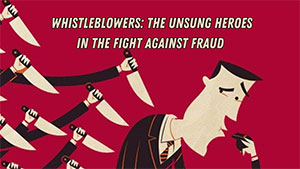Whistleblowers: The Unsung Heroes in the Fight Against Fraud
Fraud and corruption continue to pose serious threats to the integrity of public and private institutions across South Africa. While internal controls, audits, and compliance frameworks play a role in mitigating this risk, one of the most powerful tools we have at our disposal is often overlooked: the whistleblower.
Whistleblowers—those individuals brave enough to speak up against wrongdoing—are a critical yet vulnerable element in the chain of accountability. Without them, many of the most consequential fraud cases would never come to light. According to the Association of Certified Fraud Examiners, over 40% of all fraud cases are detected through tip-offs—far surpassing any other method. These insiders see what others cannot. They witness misconduct firsthand, and they often have access to documents and communications that are pivotal in proving wrongdoing.
Yet despite their immense value, whistleblowers in South Africa face significant personal risk. The stories of Babita Deokaran, who was assassinated after exposing corruption in the Gauteng Health Department, and Athol Williams, who was forced into exile after testifying at the Zondo Commission, are chilling reminders of the dangers involved. These individuals are not just sources of information—they are heroes. And they deserve far more protection and recognition than they currently receive.
Who Blows the Whistle—And Why?
There’s a common misconception that whistleblowers are disgruntled employees or individuals with personal vendettas. While some cases may include emotional motivations or grievances, many whistleblowers act out of a deep sense of ethics and justice. Staying silent can be psychologically and morally damaging. Others may feel driven by anger or disillusionment after seeing wrongdoing go unchecked. Some are simply trying to stop harm from escalating.
Whatever the motivation, what matters most is the truth. As Ireland’s Supreme Court put it: “Truth is a defence to motive.” Even when whistleblowers lack a complete understanding of the facts or context, their information can be the starting point of meaningful investigations. It’s the responsibility of forensic investigators to evaluate claims objectively, corroborate details, and distinguish fact from feeling.
Internal vs. External Reporting
Most whistleblowers don’t start by going public. In fact, research shows that 83% first try to report their concerns internally—to a supervisor, HR department, or ethics hotline. Going external—whether to the media, regulators, or civil society organisations—is often a last resort, triggered when internal systems fail or retaliate.
This points to a broader issue: if internal reporting channels are ineffective or untrustworthy, we can’t expect whistleblowers to use them. Organisations must prioritise not only the creation of these channels, but also the culture that surrounds them. Confidentiality, speed, and genuine follow-up are essential. Without them, tip-offs dry up—and with them, our ability to detect fraud in its early stages.
Building a Speak-Up Culture
Policies are important, but culture is what drives behaviour. If employees believe they will be punished, ignored, or marginalised for speaking up, no amount of policy will make a difference. Organisations must foster trust through consistent, values-driven leadership.
That means training managers to respond supportively, offering multiple channels for reporting (including anonymous platforms), and demonstrating—through action—that integrity is valued. When whistleblowers see their information acted upon, it reinforces a culture of accountability. When they see retaliation go unpunished, it reinforces fear.
Technology can also help. Secure online platforms, mobile apps, and encrypted messaging tools have made it easier and safer to report wrongdoing. Some platforms even allow whistleblowers to track the status of their report in real time, enhancing transparency. AI tools are beginning to support investigators by detecting document tampering or flagging suspicious patterns. But technology must be paired with human empathy, fairness, and discretion.
What Investigators Must Do
Forensic professionals have a duty to treat whistleblowers with care. This begins with a neutral, objective stance—avoiding assumptions and taking each report seriously. Every claim should be triaged, documented, and assessed for credibility and risk. Investigators must protect identities, preserve evidence chains, and avoid making promises they can’t keep.
Even when whistleblowers get the facts wrong, their input can still point toward real problems. An inaccurate claim should not be taken as malicious intent; it may simply reflect limited access to the full picture.
The Bigger Picture
Our legal framework is evolving. The Protected Disclosures Act offers some level of support, and the proposed Whistleblower Protection Bill aims to expand it. But legislation alone won’t solve the cultural and institutional barriers whistleblowers face.
To truly support whistleblowers, organisations must move beyond compliance and toward compassion. We must create workplaces where speaking up is seen not as a betrayal—but as a contribution to the greater good.
As forensic professionals, leaders, and citizens, we have a responsibility to protect those who protect the truth. Because when whistleblowers are silenced, corruption thrives. But when they are heard, supported, and believed, they become agents of change.
And that’s something worth standing up for.
